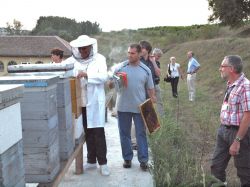Monitoring the world’s honey bee colony losses.
In recent years the world’s press has drawn attention to the problem of declining honey bee populations, in particular to “Colony Collapse Disorder” in the USA. LASI researcher Norman Carreck has just returned from the seventh meeting of the international COLOSS (Prevention of Honey Bee COLony LOSSes) Network: http://www.coloss.org/ hosted by the University of Belgrade, Serbia. This truly global network was set up in 2008, and currently consists of 270 bee scientists in 50 countries, investigating all possible causes of honey bee colony losses worldwide. The network is funded through the COST Programme of the European Science Foundation as Action FA0803.
It is now agreed by scientists that there is no single cause of honey bee colony losses, but a variety of factors, especially pests and diseases, together with environmental factors such as pesticides, beekeeping methods, and in particular, a lack of food for bees due to changes in land use, are thought to be interacting to cause the problem. The parasitic mite Varroa is, however, a common factor in colony losses worldwide, and is already known to interact with other diseases, in particular viruses. Tackling the Varroa problem is a key element of the research programme at LASI: http://www.sussex.ac.uk/lasi/sussexplan/hygienicbees
 COLOSS delegates examine hives at the Faculty of Biology, University of Belgrade
COLOSS delegates examine hives at the Faculty of Biology, University of Belgrade
The COLOSS meeting heard a range of talks showing considerable progress in understanding the causes of colony losses. The extent of these losses is being quantified using standardised surveys of beekeepers, and Norman Carreck presented a poster quantifying colony losses in England from data collected by the British Beekeepers Association: http://www.bbka.org.uk/members/technical/winter_honey_bee_losses_in_england_2007_to_2010
Other scientists within the COLOSS network are carrying out an ambitious experiment testing sixteen strains of bee at sixteen locations around Europe. At each site, the local strain of bee is being tested against two others under standardised conditions to see how each survives. Many beekeepers believe that imported bees are superior to local bees, whilst others argue that local bees are adapted to local conditions and thus better able to fight pests, diseases and other factors. The results of this experiment will enable decisions to be based on the results of controlled trials rather than on opinion.


